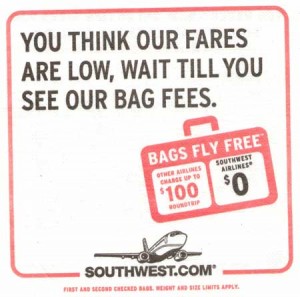Here’s an extract from Knowledge@Wharton, an online magazine from The Wharton School of Business that I subscribe to.
After losing $60 billion in the last decade — and billions more recently when a cloud of volcanic ash grounded flights across Europe — airlines are looking to consolidate as a way to return to profitability amid continued struggles with high fuel prices, competition from low-cost carriers, and a limited customer pool that shriveled even more during the recession. But experts are skeptical about the “bigger is better” strategy. Many observers say the carriers have proved downright flighty at following through on making changes that improve operations and put the customer first.
After reading this I couldn’t help thinking, why don’t these guys take a leaf out of Southwest Airlines book. That company creates a flying experience that consistently WOWs its customers and is very cost efficient to both customer and itself because it implements a sensible operational strategy, employs (and retains) amazingly loyal, engaged and empowered people, and makes air travel for both its customers and its team members a fun experience. It has an excellent on-time departure and arrival record and your bags practically always end up at the same airport that you do – sometimes even before you!
In my opinion consolidation will NOT make the airlines more profitable if past experience is any guide. It will make air travel more expensive but that does not translate to higher profit. SWA consistently makes a profit because it has a superior business model. It’s that simple. What that means is they achieve higher utilization of their assets (they turn their planes and the team members in them) around faster than other airlines, and they have higher occupancy rates so their net margin is higher. These two things result in significantly higher ROI (asset turn x net margin = ROI). Simple isn’t it? This is Business Finance 101!
Oh and one more thing, because they have more loyal customers and therefore higher capacity utilization they are able to articulate the customer value proposition that I have reproduced below. I HATE HAVING TO PAY MORE FOR MY BAGS THAN I DO FOR MY SEAT (on a recent trip with Jetstar – an Australian airline, my seat cost $129 and my bag cost $300), AND SO DOES EVERYONE ELSE I’VE ASKED. I also hate it when I get severely penalized if I have to change my schedule — at SWA that does not happen. Traveling with them is a pleasure.

